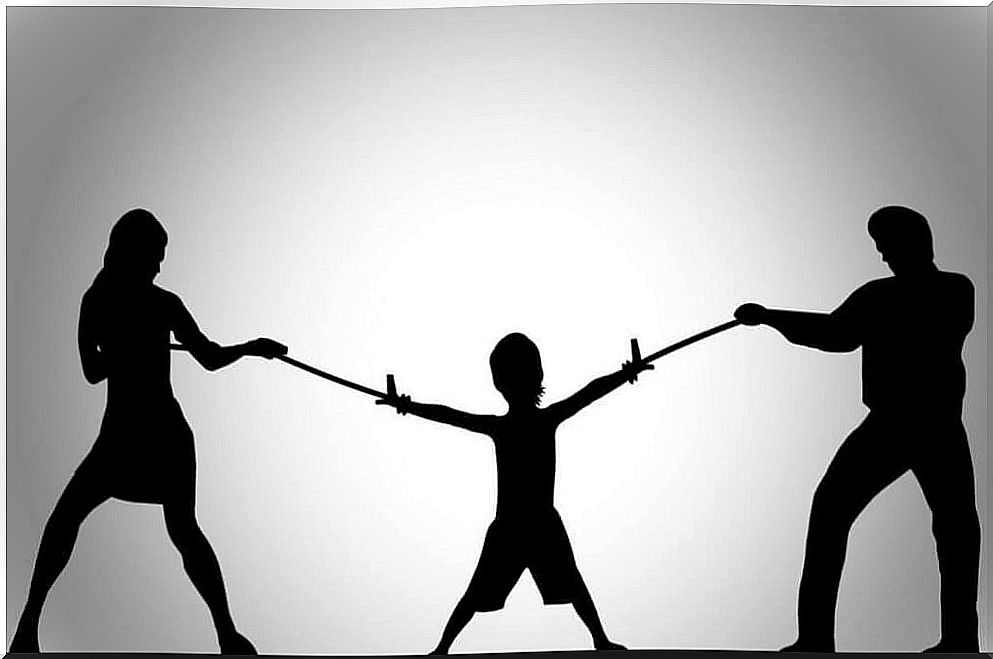Parental Alienation Syndrome: What Is It?

Divorce or parental separation often turn out to be traumatic situations for children. The family, which they consider the fundamental nucleus around which their life revolves, breaks down without them being able to do anything. A period of sadness and uncertainty will invade them, leading them to experience a strong vulnerability. This situation can be used by one of the two parents to harm the other, generating the so-called parental alienation syndrome.
It seems impossible that we can go that far. Unfortunately, hatred and contempt for one’s ex partner sometimes outweighs common sense. Many parents are not even aware of the damage they are causing in their little ones by fueling their feelings of abandonment. For these people, their own suffering is more important than that of their children, which unfortunately takes a back seat.
Telling a child that his / her father / mother does not want to see him, telling him lies about him / her or insulting the other by trying to make the child lose respect for him / her are just some examples of this type of manipulation. The psychological consequences of which the child could be a victim can be serious, generating a pathological hatred towards the parent who is affected by the parental alienation syndrome.
What is parental alienation syndrome?
Parental alienation syndrome is a form of childhood psychological abuse. It consists in influencing the children’s mind so that they change the perception they have of the other parent.
This situation can be generated by a single parent or be used by both to hurt each other. Alienating parents do not hesitate to ridicule the child if he expresses feelings for the other person. To reinforce the idea of contempt for the father or mother, many even exploit the family environment by making grandparents, uncles or friends complicit in this subtle form of mistreatment.

In these cases it is also common to tell the child about some aspects of the divorce in order to be seen as victims, so that the child feels sorry and blames the other parent for the whole situation. All to carry out a personal revenge in which the one who loses is always the child. He is the real victim of these toxic behaviors from which he should be removed.
What can lead a parent to behave like this?
When faced with a divorce, the right thing to do is to categorize. That the other was a bad partner doesn’t mean he was a bad parent. Of course, all this should not be taken into consideration if there have been cases of domestic violence against the spouse. It is logical in these cases to feel terrible fear at the idea that the ex-spouse will repeat his actions towards the little ones.
In all other cases, moving the child away from the other parent can be a sign that the separation or divorce is not proceeding properly. This phenomenon denotes a strong selfishness and a great lack of self-esteem, in addition to the lack of sensitivity and empathy that will negatively affect the children.
It can also happen that the alienating parent suffers from some type of personality disorder – the main disorders associated with these situations are narcissism and borderline personality disorder, although they do not occur frequently.

What can I do if I am a witness or victim of such behavior?
Be aware that being charged in a court of parental alienation syndrome can affect child custody. Before threatening the perpetrator of these acts and calling the police or social services, it is important to talk to him. Make him understand that his actions are not appropriate and that it is above all the child who suffers.
If despite your attempts the manipulative attitude persists, a judge will have to decide what to do. Many times children refuse to live with the other parent because of unfounded hatred. Parental alienation syndrome is a sensitive problem that most of the time requires psychological attention.
This manipulation can cause devastating effects in children – anxiety and fear at the idea of contact with the parent can affect their relationship with them, as well as alter their emotional development.
Seeing oneself ridiculed, undervalued, or underestimated for expressing positive feelings towards the other parent can in turn affect the child’s self-esteem, which in many cases can carry the trauma into adulthood, creating an irreparable break with the parent involved.
As we have seen, parental alienation syndrome deserves special attention. A separation or divorce does not have to become a psychological battle between two people who once made the decision to maintain a relationship. Much less an opportunity to use children to cause further pain.
Faced with this situation, the best thing is to try to manage it in the best possible way in order to avoid greater harm, to yourself and to others. Separating or divorcing is not pleasant, especially when the protagonists contribute to making the situation worse.









